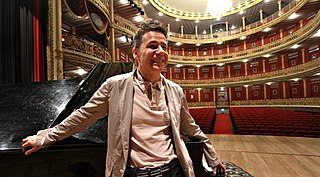Related Research Articles

Rachel de Queiroz was a Brazilian author, translator and journalist.

Maria Lacerda de Moura was a Brazilian teacher, writer and anarcha-feminist. The daughter of spiritist and anti-clerical parents, she grew up in the city of Barbacena, in the interior of Minas Gerais, where she graduated as a teacher at the Escola Normal Municipal de Barbacena and participated in official efforts to tackle social inequality through national literacy campaigns and educational reforms.
José Moura Gonçalves, Brazilian physician, biomedical scientist, biochemist and educator, one of the pioneers of biochemistry in the country.

The Brazilian Society of Physiology is a learned society and association of students and professionals in physiology in Brazil. It is a member of the Brazilian Federation of Experimental Biology Societies (FeSBE) and of the Brazilian Society for the Advancement of Science (SBPC). Internationally, it is the country's representative at the International Union of Physiological Sciences (IUPS) and at the Latin American Association of Physiological Sciences.
Brasileiros e Brasileiras is a Brazilian telenovela shown in some schedules SBT between November 5, 1990 and May 14, 1991. Writing for the show was done by Carlos Alberto Sofredini and Walter Avancini, who also directed it. The show was a co-production of the Miksom.

Robertinho Silva is a Brazilian drummer known for jazz. His first album was Música Popular Brasileira in 1981.
Movimento Negro is a generic name given to the diverse Afro-Brazilian social movements that occurred in 20th-century Brazil, particularly those movements that appeared in post-World War II Rio de Janeiro and São Paulo.

Eduardo Giannetti da Fonseca is a Brazilian economist and author, educated at the University of São Paulo, with specialization in Social Science, Economics, Administration, and Accounting.

Paulo Moura was a Brazilian clarinetist and saxophonist.

Octavio Moura Andrade Municipal Airport, often referred to as São Pedro Airport, is the airport serving São Pedro, Brazil.
Igor Rickli Christóforo is a Brazilian actor.

Eva Todor Nolding was a Brazilian actress and dancer.
Eduardo Escorel de Morais, most known as Eduardo Escorel, is a Brazilian film editor and director. He debuted as an editor on the Joaquim Pedro de Andrade's The Priest and the Girl (1965). With his first feature film, Lição de Amor, he won the Best Director Award at the 1976 Gramado Film Festival. He was also awarded Best Director for his second film, Ato de Violência, this time at the 1980 Brasília Film Festival. He won Best Editing Award for Guerra Conjugal and O Chamado de Deus at the 1974 and 2000 Brasília Film Festival respectively, and for Dois Perdidos numa Noite Suja at the 2002 Gramado Film Festival.

Events in the year 1949 in Brazil.

José Carvalho is a Brazilian screenwriter, script doctor and dramaturgy professor. He has written scripts for the big and small screens since the early 90s. Some of his most well-known works include Castelo Rá-Tim-Bum, Bruna Surfistinha, Faroeste Caboclo and the classic soap opera Xica da Silva. With an MA in Literature from PUC-Rio, Carvalho has taught courses at not only his alma-mater, but also renowned Brazilian production houses such as O2 Filmes and Globo.

Chôros No. 5 is a solo piano composition written in 1925 by the Brazilian composer Heitor Villa-Lobos. It forms a part of a series of fourteen numbered compositions collectively titled Chôros, ranging from solos for guitar and for piano up to works scored for soloist or chorus with orchestra or multiple orchestras, and in duration up to over an hour. Chôros No. 5 is one of the shorter members of the series, with a performance lasting about four-and-a-half minutes.

The Subaé River is a river in Bahia state of Brazil. It has its source in the city of Feira de Santana and runs 55 kilometres (34 mi) to the mouth at the Baía de Todos os Santos. The river was used by the Portuguese to create a large-scale sugarcane production in the Recôncavo region. The city of Santo Amaro was built on terraced land above the river. It has a single tributary, the Serjimirim River.
Emanuel Leone Moura, commonly known as Emanuel, is a Brazilian professional footballer who plays as a centre-back for Spartak Varna.

Marcelo Bratke is a Brazilian pianist.
Maria Helena de Moura Neves was a Brazilian linguist known for her work on language use, especially functional approaches to Portuguese grammar. She also conducted research on the history and teaching of grammar. She was professor emerita at São Paulo State University, and also lectured at Mackenzie Presbyterian University. In 2022 she received the Ester Sabino Award in the Senior Researcher category.